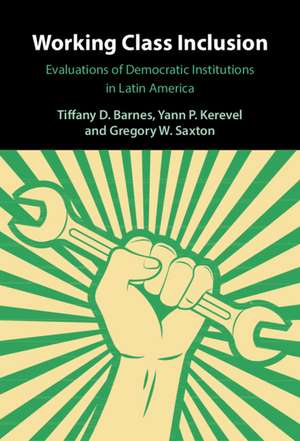Working Class Inclusion: Evaluations of Democratic Institutions in Latin America
Autor Tiffany D. Barnes, Yann P. Kerevel, Gregory W. Saxtonen Limba Engleză Hardback – 29 noi 2023
Preț: 593.09 lei
Preț vechi: 651.75 lei
-9% Nou
Puncte Express: 890
Preț estimativ în valută:
113.59€ • 117.03$ • 95.15£
113.59€ • 117.03$ • 95.15£
Carte tipărită la comandă
Livrare economică 22 februarie-08 martie
Preluare comenzi: 021 569.72.76
Specificații
ISBN-13: 9781009349819
ISBN-10: 1009349813
Pagini: 250
Dimensiuni: 237 x 160 x 24 mm
Greutate: 0.56 kg
Editura: Cambridge University Press
Colecția Cambridge University Press
Locul publicării:New York, United States
ISBN-10: 1009349813
Pagini: 250
Dimensiuni: 237 x 160 x 24 mm
Greutate: 0.56 kg
Editura: Cambridge University Press
Colecția Cambridge University Press
Locul publicării:New York, United States
Cuprins
1. Introduction; 2. A Theory of Working-Class Inclusion; 3. Do Voters Want to Be Represented by Workers?; 4. Will Any Worker Do? The Role of Policy in Linking Workers' Presence to Evaluations of Representatives; 5. Will Any Worker Do? Linking Parties to Workers in Argentina and Mexico; 6. How Do Voters Know Workers Are in Office? Political Incentives, Journalistic Dissemination, and People's Ability to Intuit Class; 7. How Do Voters Know Workers Are in Office? Interest in Politics, News Consumption, and Evaluations of Institutions; 8. Conclusion.
Notă biografică
Descriere
Leverages experiments and cross-national surveys from Latin America to examine the impacts of working-class underrepresentation in government.
